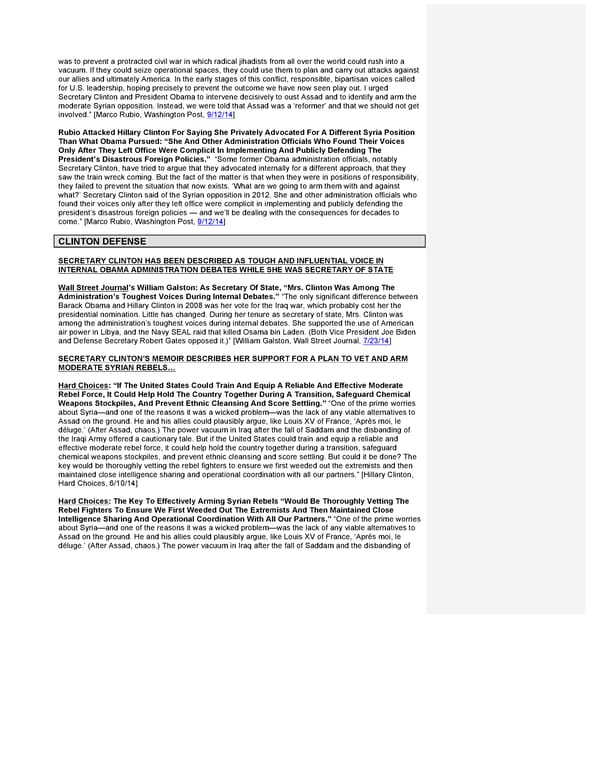was to prevent a protracted civil war in which radical jihadists from all over the world could rush into a vacuum. If they could seize operational spaces, they could use them to plan and carry out attacks against our allies and ultimately America. In the early stages of this conflict, responsible, bipartisan voices called for U.S. leadership, hoping precisely to prevent the outcome we have now seen play out. I urged Secretary Clinton and President Obama to intervene decisively to oust Assad and to identify and arm the moderate Syrian opposition. Instead, we were told that Assad was a ‘reformer’ and that we should not get involved.” [Marco Rubio, Washington Post, 9/12/14] Rubio Attacked Hillary Clinton For Saying She Privately Advocated For A Different Syria Position Than What Obama Pursued: “She And Other Administration Officials Who Found Their Voices Only After They Left Office Were Complicit In Implementing And Publicly Defending The President’s Disastrous Foreign Policies.” “Some former Obama administration officials, notably Secretary Clinton, have tried to argue that they advocated internally for a different approach, that they saw the train wreck coming. But the fact of the matter is that when they were in positions of responsibility, they failed to prevent the situation that now exists. ‘What are we going to arm them with and against what?’ Secretary Clinton said of the Syrian opposition in 2012. She and other administration officials who found their voices only after they left office were complicit in implementing and publicly defending the president’s disastrous foreign policies — and we’ll be dealing with the consequences for decades to come.” [Marco Rubio, Washington Post, 9/12/14] CLINTON DEFENSE SECRETARY CLINTON HAS BEEN DESCRIBED AS TOUGH AND INFLUENTIAL VOICE IN INTERNAL OBAMA ADMINISTRATION DEBATES WHILE SHE WAS SECRETARY OF STATE Wall Street Journal’s William Galston: As Secretary Of State, “Mrs. Clinton Was Among The Administration’s Toughest Voices During Internal Debates.” “The only significant difference between Barack Obama and Hillary Clinton in 2008 was her vote for the Iraq war, which probably cost her the presidential nomination. Little has changed. During her tenure as secretary of state, Mrs. Clinton was among the administration’s toughest voices during internal debates. She supported the use of American air power in Libya, and the Navy SEAL raid that killed Osama bin Laden. (Both Vice President Joe Biden and Defense Secretary Robert Gates opposed it.)” [William Galston, Wall Street Journal, 7/23/14] SECRETARY CLINTON’S MEMOIR DESCRIBES HER SUPPORT FOR A PLAN TO VET AND ARM MODERATE SYRIAN REBELS… Hard Choices: “If The United States Could Train And Equip A Reliable And Effective Moderate Rebel Force, It Could Help Hold The Country Together During A Transition, Safeguard Chemical Weapons Stockpiles, And Prevent Ethnic Cleansing And Score Settling.” “One of the prime worries about Syria—and one of the reasons it was a wicked problem—was the lack of any viable alternatives to Assad on the ground. He and his allies could plausibly argue, like Louis XV of France, ‘Après moi, le déluge.’ (After Assad, chaos.) The power vacuum in Iraq after the fall of Saddam and the disbanding of the Iraqi Army offered a cautionary tale. But if the United States could train and equip a reliable and effective moderate rebel force, it could help hold the country together during a transition, safeguard chemical weapons stockpiles, and prevent ethnic cleansing and score settling. But could it be done? The key would be thoroughly vetting the rebel fighters to ensure we first weeded out the extremists and then maintained close intelligence sharing and operational coordination with all our partners.” [Hillary Clinton, Hard Choices, 6/10/14] Hard Choices: The Key To Effectively Arming Syrian Rebels “Would Be Thoroughly Vetting The Rebel Fighters To Ensure We First Weeded Out The Extremists And Then Maintained Close Intelligence Sharing And Operational Coordination With All Our Partners.” “One of the prime worries about Syria—and one of the reasons it was a wicked problem—was the lack of any viable alternatives to Assad on the ground. He and his allies could plausibly argue, like Louis XV of France, ‘Après moi, le déluge.’ (After Assad, chaos.) The power vacuum in Iraq after the fall of Saddam and the disbanding of
 2016er Attacks - HRC Defense Master Doc Page 28 Page 30
2016er Attacks - HRC Defense Master Doc Page 28 Page 30